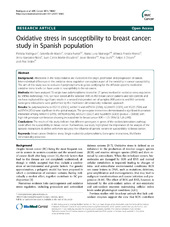| dc.contributor.author | Rodrigues, Patricia | en_US |
| dc.contributor.author | de Marco, Griselda | en_US |
| dc.contributor.author | Furriol, Jessica | en_US |
| dc.contributor.author | Mansego, Maria L. | en_US |
| dc.contributor.author | Pineda-Alonso, Mónica | en_US |
| dc.contributor.author | Gonzalez-Neira, Anna | en_US |
| dc.contributor.author | Martin-Escudero, Juan C. | en_US |
| dc.contributor.author | Benitez, Javier | en_US |
| dc.contributor.author | Lluch, Ana | en_US |
| dc.contributor.author | Chaves, Felipe J. | en_US |
| dc.contributor.author | Eroles, Pilar | en_US |
| dc.date.accessioned | 2014-12-09T14:57:00Z | |
| dc.date.available | 2014-12-09T14:57:00Z | |
| dc.date.issued | 2014-11-21 | eng |
| dc.identifier.issn | 1471-2407 | |
| dc.identifier.uri | https://hdl.handle.net/1956/8860 | |
| dc.description.abstract | Background: Alterations in the redox balance are involved in the origin, promotion and progression of cancer. Inter-individual differences in the oxidative stress regulation can explain a part of the variability in cancer susceptibility. The aim of this study was to evaluate if polymorphisms in genes codifying for the different systems involved in oxidative stress levels can have a role in susceptibility to breast cancer. Methods: We have analyzed 76 single base polymorphisms located in 27 genes involved in oxidative stress regulation by SNPlex technology. First, we have tested all the selected SNPs in 493 breast cancer patients and 683 controls and we have replicated the significant results in a second independent set of samples (430 patients and 803 controls). Gene-gene interactions were performed by the multifactor dimensionality reduction approach. Results: Six polymorphisms rs1052133 (OGG1), rs406113 and rs974334 (GPX6), rs2284659 (SOD3), rs4135225 (TXN) and rs207454 (XDH) were significant in the global analysis. The gene-gene interactions demonstrated a significant four-variant interaction among rs406113 (GPX6), rs974334 (GPX6), rs105213 (OGG1) and rs2284659 (SOD3) (p-value = 0.0008) with high-risk genotype combination showing increased risk for breast cancer (OR = 1.75 [95% CI; 1.26-2.44]). Conclusions: The results of this study indicate that different genotypes in genes of the oxidant/antioxidant pathway could affect the susceptibility to breast cancer. Furthermore, our study highlighted the importance of the analysis of the epistatic interactions to define with more accuracy the influence of genetic variants in susceptibility to breast cancer. | en_US |
| dc.language.iso | eng | eng |
| dc.publisher | BioMed Central | eng |
| dc.rights | Attribution CC BY | eng |
| dc.rights.uri | http://creativecommons.org/licenses/by/4.0 | eng |
| dc.subject | Breast cancer | eng |
| dc.subject | Oxidative stress | eng |
| dc.subject | Single nucleotide polymorphisms | eng |
| dc.subject | Gene-gene interactions | eng |
| dc.subject | Multifactor dimensionality reduction | eng |
| dc.title | Oxidative stress in susceptibility to breast cancer: study in Spanish population | en_US |
| dc.type | Peer reviewed | |
| dc.type | Journal article | |
| dc.date.updated | 2014-11-29T04:03:52Z | |
| dc.description.version | publishedVersion | en_US |
| dc.rights.holder | Copyright 2014 Rodrigues et al.; licensee BioMed Central Ltd | |
| dc.rights.holder | Patricia Rodrigues et al.; licensee BioMed Central Ltd. | |
| dc.source.articlenumber | 861 | |
| dc.identifier.doi | https://doi.org/10.1186/1471-2407-14-861 | |
| dc.source.journal | BMC Cancer | |
| dc.source.40 | 14 | |

